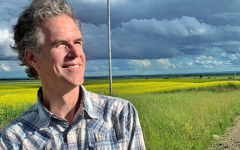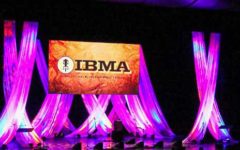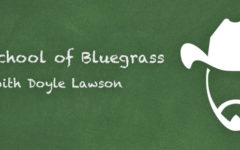
 Reflecting back on the past year, it’s been a busy and eventful one, and I don’t need a guardian angel Clarence to help me realize it’s a wonderful life.
Reflecting back on the past year, it’s been a busy and eventful one, and I don’t need a guardian angel Clarence to help me realize it’s a wonderful life.
Our CD It’s My Turn, released in late 2010, received a good deal of airplay across the country and around the world. We played more than ever, received fan email, snail mail, and we’re going to be traveling even more in the coming year. I began an exciting experience in my association with Bluegrass Today. Having a platform to express my thoughts and opinions, and more importantly just to spread the Gospel — good news — of all that is beautiful and moving about our music, is very fulfilling. I gave away my only daughter’s hand in marriage in a storybook ceremony, including bluegrass music at the reception (what fairy tale included a bluegrass band at the ball?).
With all of this, one of the most memorable experiences this year, both for positive and negative reasons, was our first, and likely last, Gabefest — a full-blown, three-day bluegrass festival. I feel like a few comments, directed primarily at our fellow musicians, might be food for thought.
Every musician with any aspirations of a professional career in music should be required to promote a festival or major concert event at least once. It forces a musician to become a businessman, at least temporarily, and to think about aspects of the music business that many musicians rarely consider.
You Can’t Just Book Your Friends And Favorites
I’ve had the pleasure of booking and organizing events over the past twenty years which have been underwritten by business and governmental entities, the fun part of which is not having to worry about generating ticket sales to pay for the event. However, our Gabefest was “on our nickel,” and forced us to give serious thought to who we believed could “put butts in seats.” Friendship is a wonderful thing, but you have to set the friendship aside and give serious consideration to whether your friend is going to draw a crowd and sell tickets.
The feel-good warmth of rewarding your friend with a booking will fade quickly if the event flops and you have to go into debt, or dig into savings, to pay your friend. Imagine the harm to your friendship if you were to ask your friend to take a cut in pay to help you out, because after all, what are friends for?
Likewise, you can’t put too much weight on your favorite style and artists, unless you’re just throwing yourself a party and paying the band for your own entertainment. What matters is what your audience wants to hear and who they are willing to pay to see.
Don’t Swoop In, Play, Hide Out And Slide On Out
As musicians, it’s easy to focus on our needs, without giving serious considerations to the promoters’ needs. Unlike when I started attending festivals in the 1970’s when bands playing all weekend, or at least two days, at festivals was a common occurrence, most bands play a single day at a multi-day event and usually are coming from another event and/or leaving for another event, the end result of which is less time to interact with the audience and parking lot pickers. Many bands arrive just in time to tune up and play, visit their product table briefly, hide out on the bus if they have a second set, and pack up to leave as soon as possible after their second set.
An event is more eventful if the audience, many of whom are parking lot pickers and aspiring musicians, gets to actually speak with and visit with the touring stage performers. Especially if that interaction is not rushed, in a crowd at the product table. Many of my greatest memories of early interactions with my heroes were conversations at the concession stand, standing around the festival grounds, late nights at the campfire (whether they joined the jam session or not), having a bite or drink with us at our camper, etc. Inviting the audience to visit you at your product table is good business, but a lot of relationships are developed by going that extra step, after the crowd at the product table has dispersed, of going out and spending time to reach those who may not buy a CD today, but will go home with a story to tell (and they will tell it over and over) and will come back again to this event and to other venues you may be playing.
Promotion Is Not Just The Promoter’s Job
Amazingly to me, I had a friend who is a touring professional complain about the group’s management constantly nagging them about being more active in interacting with fans in social media, particularly in “talking up” upcoming show dates. His view is “that’s not my job.” Perhaps this is true, but fans want interaction with the “stars”, not their managers and promoters. Yes, you can have “people” who ghost write, and promoters can’t put all the burden on bands to promote themselves, but there’s no substitute for personal outreach by a band to its fans.
Musicians Are Paid What The Market Will Bear
I commented on a common Facebook complaint by musicians about the underappreciation and undervaluing of live music, the short version of which compared what it would cost to hire five or six plumbers to work for five or six hours on a Saturday night with what most want to pay a band. My comment was that the comparison doesn’t hold water (sorry) because most people consider functional plumbing a necessity, while music is wonderful, beautiful, and part of what makes life worth living, but not necessary to a basic standard of living (as well as the fact that the desire for music can be satisfied without paying plumbers wages — recorded music, a concert ticket, or hiring a band that’s not trying to make working wages).
If I recall my six hours of undergraduate economics classes, price is a function of supply and demand. Thus, the only way to increase wages is to control the supply, to increase demand, or to impact both. You can’t control the overall supply of live music, but you can control the supply of your music, and by creating a unique identity that distinguishes you from all the other available bands/musicians, you increase demand of the supply you control.
Promoters are driven, by survival instinct, to pay only what they have to pay to secure those acts that will in turn attract ticket buyers to part with their money. If there are acts that will play for less pay and sell more tickets, those acts will be in demand.
All of the above is not news to successful professional musicians, but actually walking in a promoter’s shoes, even for a short distance, would benefit any musician. Understanding how promoters think, giving thought to how to make yourself more attractive to promoters, and cooperating to produce a successful event benefits everyone involved. Lest anyone perceive me as a know-it-all, I readily confess that after much thought, work, and investment of heart and money we didn’t have to gamble with, our Gabefest resulted in a large financial loss.
The photo above was taken to serve as part of a logo for Gabefest (it features my father, known throughout his life as “Gabe” and his great-grandson, my great-nephew, Gabe Graley).
Plans for any future Gabefest are on hold for the present time, but I still consider it a valuable experience.
Happy New Year!








